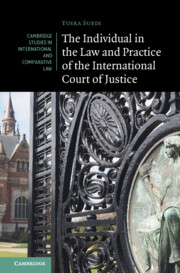Book contents
- The Individual in the Law and Practice of the International Court of Justice
- Cambridge Studies in International and Comparative Law: 192
- The Individual in the Law and Practice of the International Court of Justice
- Copyright page
- Contents
- Foreword
- Acknowledgements
- Table of Cases
- Introduction
- Part I The Individual in the Law of the International Court of Justice
- Part II The Individual in the Practice of the International Court of Justice
- 6 Maritime Disputes
- 7 Territorial Disputes
- 8 Environmental Disputes
- 9 Sources
- 10 Remarks on Practice
- 11 Final Thoughts
- Bibliography
- Index
- Cambridge Studies in International and Comparative Law
10 - Remarks on Practice
from Part II - The Individual in the Practice of the International Court of Justice
Published online by Cambridge University Press: 25 March 2025
- The Individual in the Law and Practice of the International Court of Justice
- Cambridge Studies in International and Comparative Law: 192
- The Individual in the Law and Practice of the International Court of Justice
- Copyright page
- Contents
- Foreword
- Acknowledgements
- Table of Cases
- Introduction
- Part I The Individual in the Law of the International Court of Justice
- Part II The Individual in the Practice of the International Court of Justice
- 6 Maritime Disputes
- 7 Territorial Disputes
- 8 Environmental Disputes
- 9 Sources
- 10 Remarks on Practice
- 11 Final Thoughts
- Bibliography
- Index
- Cambridge Studies in International and Comparative Law
Summary
This chapter concludes that the individual is considered in the legal reasoning of the Court in the identified contexts to a minor extent and offers reflections on the reasons for this. It recapitulates reflections on formalism and stability that are key in maritime and territorial boundary disputes. It notes that the Court is correctly limited to the request of the parties and cannot innovate beyond their submissions. However, across all chapters it was observed that state litigants often raise concerns about individuals in their custody. It therefore challenges the Court’s judicial caution when faced with potentially developing international law in addressing state’s concerns. It argues that while the Court does not have a formal law-making function, it develops international law nonetheless through its interpretations and clarifications and should not hesitate to do so when clarification is sought by state litigants on matters relating to the affected individuals in such disputes.
Keywords
- Type
- Chapter
- Information
- Publisher: Cambridge University PressPrint publication year: 2025

